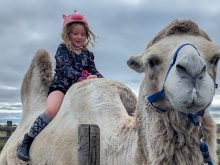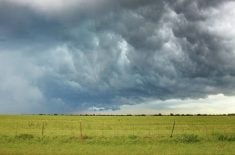Marianne Stamm will always be a mzungu, the Swahili word for white person or foreigner.
After 10 trips to Zambia, where she and her husband, Robert, worked on agricultural projects designed to help Zambians learn more productive farming methods, she wrote a book about her experiences as a mzungu but also as a friend and teacher.
Laughter in the Shadows: Stories of Courage from 11 Zambian Women, was published this fall.
Stamm may be familiar to some Western Producer readers. She is a former freelance writer who also wrote a blog on the newspaper’s website. She and Robert farmed near Westlock, Alta., and still own property there that is rented to other farmers.
Read Also

A power of attorney document may no longer be enough
Recently, some financial institutions have begun imposing their own internal form of “verification” requirement with respect to powers of attorney.
For the moment, Schleithein, Switzerland, is home, where the Stamms have taken over Robert’s parents’ farm and near where their two sons and grandchildren now live.
They first visited Zambia as agricultural volunteers through a church mission but later got in-volved in other projects.
The book tells the stories of Zambian women and the challenges they face due to the patriarchal culture, limited knowledge of agriculture and the scourge of HIV.
“The main emphasis for us was always on consulting and teaching and linking up with information,” Stamm said in a Dec. 8 interview.
“It was rewarding. We’ve given a lot but I got so much back.”
Her book, divided into a chapter for each woman profiled, re-counts their working lives and explains Stamm’s own challenges in understanding the culture and working within it.
She tells the stories of Jacinta, a small-scale farmer whose recent production improvements are the envy of others. Loveness, another woman featured in the book, is straddling Zambian culture and the ways of the Western world, often to the dismay of her husband.
Christine, who is also profiled, took the agricultural knowledge she gained and taught it to others. Then there are the tales of Eva, Margaret, Naomie, Clara, Vivienne, Lwiche, Eliness and Juliet.
Each has a compelling story, which Stamm describes while giving her own impressions and experiences with Zambian travel, culture and family relationships.
Stamm said the book took four years to write. She began in 2011 with a grant from the Alberta Foundation for the Arts. That grant provided her with a deadline and once finished the writing, she decided to self-publish 150 copies in Switzerland and 200 in Canada. All of them are now gone through marketing efforts mostly confined to public readings but a second printing is planned.
Stamm varies the readings with the audience, but she admits particular enjoyment when reading the chapter on Vivienne, who became and remains a friend.
“I’m a very bad judge of my own writing. I don’t know which story is the best. But she is someone I enjoyed writing about, although I enjoyed writing about them all.”
Stamm said she loves Zambia but life there, even in three-month-long stints, was not always easy.
“I love Africa. I love it and I hate it at the same time. There’s so much about it that’s so frustrating,” she said.
“Sometimes I would just like to be black. I would just like to change my colour and disappear. My being there gave them different expectations than if I hadn’t been, because they would think there was money in the room. My skin is always money.”
She and Robert were able to share information on tillage, planting methods, fertilizer and other aspects of farming, but getting that information to a wider audience is difficult in Zambia, she said.
Government bureaucracy is often a hurdle, as is the culture that gives fewer rights to women than to men.
Stamm is giving $5 from every book sale toward the education of one Zambian woman, and will help more women if future sales allow.
“I still believe that education is the thing. All our research shows that women who are educated have less children, take care of them better. Their children have more options.… I think that’s the biggest thing we can do for them.”
After working in Africa and then returning home, Stamm said she would often be asked if she and Robert had done any good or fostered positive change in Zambia.
“Then I ask them ‘what change did you make in those three months?’ Any real change takes a long time.”
In an excerpt from the book, Stamm discusses the challenge of living within a different culture and in the role of helper and teacher.
“Zambia can be a lonely place for me at times — in a culture not my own, among a people who are so different from me that I sometimes think I can never belong.
“In fact, I know that I can never belong, as they do. It is a bit of a shock, too, sometimes to realize that what I might want to bring to these people, they don’t even really want or, I might have to acknowledge, need.”
But far from introspective, the book provides many insights into Zambian culture and the successes achieved one step at a time.
Stamm said the farm project manager told her things are difficult for farmers this year. The planting season was supposed to begin in mid-November, but intermittent showers meant the corn had not yet germinated.
Last year was already a poor year and many people went hungry. In addition, the Zambian kwacha has depreciated and seed, fertilizer and imports are expensive.
For more information, contact Stamm at marerobster@gmail.com.
















